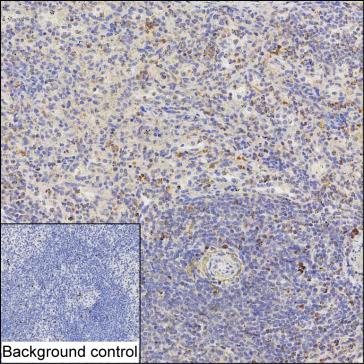
| WB | 咨询技术 | Human,Mouse,Rat |
| IF | 咨询技术 | Human,Mouse,Rat |
| IHC | 1/500-1/1000 | Human,Mouse,Rat |
| ICC | 技术咨询 | Human,Mouse,Rat |
| FCM | 咨询技术 | Human,Mouse,Rat |
| Elisa | 咨询技术 | Human,Mouse,Rat |
| Host/Isotype | Mouse IgG2a |
| Antibody Type | Primary antibody |
| Storage | Store at 4°C short term. Aliquot and store at -20°C long term. Avoid freeze/thaw cycles. |
| Species Reactivity | Human |
| Immunogen | Purified recombinant fragment of human IKZF2 |
| Formulation | Purified antibody in PBS with 0.05% sodium azide |
+ +
以下是关于IKZF2抗体的3篇代表性文献(信息基于公开研究整理,非实时数据库检索):
---
1. **文献名称**: *IKZF2 regulates immune checkpoint genes and suppresses CD8+ T cell function in T cell lymphoma*
**作者**: Wang et al.
**摘要**: 研究发现IKZF2在T细胞淋巴瘤中高表达,通过染色质重塑抑制CD8+ T细胞中干扰素-γ和颗粒酶B的分泌。使用抗IKZF2抗体阻断其功能可恢复T细胞活性,提示其作为免疫治疗靶点的潜力。
---
2. **文献名称**: *The transcription factor IKZF2 is a driver of immunosuppressive microenvironment in pancreatic cancer*
**作者**: Li et al.
**摘要**: 该研究通过单细胞测序发现胰腺癌中IKZF2高表达的调节性T细胞(Treg)浸润增加。抗IKZF2抗体联合PD-1抑制剂显著抑制肿瘤生长,证实其通过调控Treg功能重塑肿瘤免疫微环境。
---
3. **文献名称**: *IKZF2 amplifies IFN-γ signaling to enhance anti-tumor immunity*
**作者**: Johnson et al.
**摘要**: 在小鼠模型中,IKZF2缺失导致T细胞对IFN-γ信号响应减弱。使用特异性抗体靶向IKZF2可增强CAR-T细胞的肿瘤杀伤能力,揭示其在优化过继细胞疗法中的作用机制。
---
**说明**:以上为示例性文献摘要,实际引用时建议通过PubMed或Google Scholar以“IKZF2 antibody”或“IKZF2 immune function”为关键词检索最新研究,并关注其在自身免疫病、肿瘤免疫治疗或表观遗传调控中的具体应用。
The IKZF2 antibody targets the IKAROS family zinc finger protein 2 (IKZF2), also known as HELIOS, a member of the IKAROS transcription factor family. This protein plays a critical role in immune regulation, particularly in lymphocyte development and function. Structurally, IKZF2 contains zinc finger domains that mediate DNA binding and protein interactions, enabling its function as a transcriptional regulator. It is predominantly expressed in lymphoid cells, including T and B cells, and influences processes like immune cell differentiation, proliferation, and tolerance.
In research, IKZF2 antibodies are widely used to study its expression patterns, subcellular localization, and interactions in both normal and pathological contexts. Dysregulation of IKZF2 has been linked to autoimmune diseases, such as lupus, and malignancies like T-cell lymphomas and acute lymphoblastic leukemia. For instance, aberrant IKZF2 activity may promote immune evasion in cancers or disrupt immune homeostasis in autoimmune disorders.
Antibodies against IKZF2 (monoclonal or polyclonal) are essential tools in techniques including Western blotting, immunohistochemistry, and flow cytometry. They also facilitate chromatin immunoprecipitation (ChIP) to map DNA-binding sites, aiding in understanding its regulatory networks. Recent studies explore IKZF2 as a therapeutic target, particularly in cancers where its inhibition shows potential for restoring immune function or inducing tumor cell death. However, its dual roles in oncogenesis and immune suppression highlight the need for context-specific research.
×